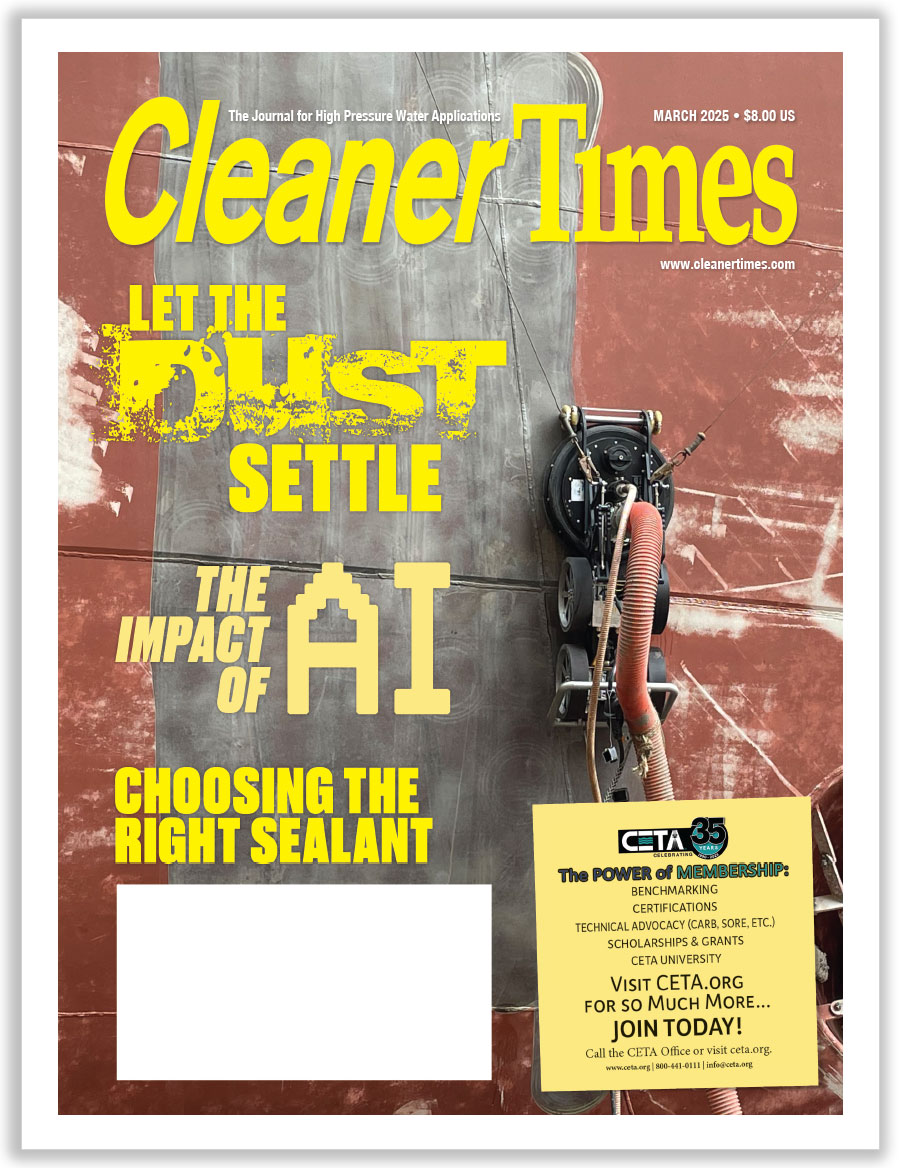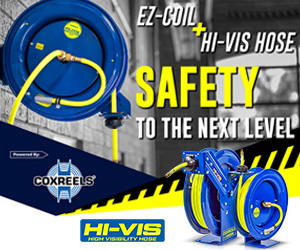
Financial: When Income Counts
By Mark E. Battersby / Published December 2016

Sometimes the accounting rules and the tax laws are logical and equitable; sometimes they aren’t. However, one question always seems to surface: when is a pressure cleaning business’s revenue considered “income”? Although it’s not unusual that there is a specific time to secure deductions or to include revenue, the time to claim income and deductions is dictated by rules or laws—not the contractor or the pressure washing operation’s manager’s opinion.
Revenue = Income… Sometimes
Revenue is an important financial measure for every pressure cleaning business. Owners, managers, shareholders, lenders, analysts, investors, and regulators all use revenue to monitor an operation’s financial performance and its general financial health.
In addition to its impact on every operation’s tax bill, revenue may also affect, among other things, a pressure cleaning operation’s ability to borrow money or attract investors. It is also often used as a basis for determining certain employee compensation and benefits, such as commissions, bonuses, and stock-based compensation. Anticipated revenue may also influence an operation’s tax-planning strategies.
With the cash basis method of accounting used by most of us in our personal lives, revenue is recognized when cash is received regardless of when goods or services were sold. Under the accrual method of accounting, revenue is recognized when it is either realized or realizable, and is earned (usually when goods are transferred or services rendered), no matter when cash is actually received.
The so-called “revenue recognition” principle is a cornerstone of the accrual method of accounting which, with the so-called “matching principle,” determines the time when revenues and expenses are recognized.
New Rules Rule
After years of deliberations, the Financial Accounting Standards Board (FASB) issued an Accounting Standards Update (ASU) that attempts to answer the question of when revenue is income. At its core, the new ASU guidance states that a pressure cleaning business “should recognize revenue that shows the transfer of promised goods or services in an amount that reflects the consideration to which the operation expects to be entitled to in exchange for those goods or services.” What could be clearer?
In general, the new revenue recognition principle states that businesses using the accrual basis of accounting should only record revenue when it has substantially completed a revenue generation process. In other words, revenue is recorded when it has been earned.
Going one step further, the new guidelines state that cash can be received in either an earlier or later period than obligations are met (when goods or services are delivered) and related revenues are recognized. Naturally, all revenue realized during an accounting period is included in the waterjetting operation’s income.
Obviously, if there is any doubt whether payment will be received from a customer, then the seller should recognize an allowance for doubtful accounts for the amount it is expected the customer will renege. If there is substantial doubt that any payment will be received, the pressure cleaning business should not recognize any revenue until a payment is actually received.
Also under the accrual basis of accounting, if a business receives payment in advance, it is recorded as a liability, not as revenue. Only after it has completed all work under the arrangement with the customer can the business recognize the payment as revenue.
Compensation “IFS”
Because many pressure cleaning businesses have compensation plans for managers, sales personnel, shareholder/employees, executives, or others who are tied to revenue, compensation arrangements are emerging as a big concern under the new revenue recognition standard. In fact, many of those working to implement the new revenue recognition standard are already encountering challenges with compensation policies.
Although the effective date for public companies is annual reporting periods beginning after December 15, 2017, the new standard could result in earlier recognition of revenue which, in turn, could lead to higher commissions or bonuses. In other words, for some pressure cleaning operations the standard will change the timing of when revenue will be recognised and therefore may change the way compensation is awarded under existing profit-sharing arrangements. This is one reason why a number of pressure washing businesses may need to include human resources professionals in their discussions as the new revenue recognition standard is implemented.
Sales Taxes
Under the new revenue guidelines, the transaction price is the “amount of consideration to which an entity expects to be entitled in exchange for transferring promised goods or services to a customer, excluding amounts collected on behalf of third parties.” Questions of whether sales and similar taxes should be excluded from the transaction price quickly arose during the negotiations that led up to the issuance of these latest guidelines.
The new revenue guidelines provide guidance on assessing whether a pressure cleaning business is considered to be a principal or an agent in a given transaction and, therefore, whether sales taxes should be presented in the operation’s gross income or net within revenue. This analysis is further complicated by the sales tax in each tax jurisdiction, especially for businesses that have operations in more than one taxing jurisdiction.
The new accounting guidelines permit the pressure cleaning business to ignore all sales taxes assessed by a government authority and that are “imposed on and concurrent with a specific revenue-producing transaction and collected by the business.” The new guidelines don’t, however, apply to taxes assessed on “an entity’s total gross receipts or imposed during the inventory procurement process.”
More Accounting and Tax Rules
Because the new guidelines require businesses to estimate the effects of sales incentives, discounts, and warranties, the updated guidance will, in many cases, result in earlier revenue recognition. The new rules also provide guidance for transactions that weren’t addressed completely, such as service revenue and contract modifications.
Nearly all businesses will be affected by the expanded financial disclosures required under the new guidelines. The new rules call for detailed footnote disclosures that break down revenues by product lines, geographic markets, contract length, services, and physical goods. Exceptions to the new rules include insurance contracts, leases, financial instruments, guarantees, and non-monetary exchanges between entities in the same line of business to facilitate sales. These transactions remain within the scope of existing industry-specific GAAP.
Ground Rules for Deductions and Income
When claiming deductions or write-offs and timing the receipt of income under the new guidelines, there are a number of crucial steps every pressure cleaning business should take:
• File a valid tax return. There are options such as filing an amended return, but there could be problems if the operation’s tax returns are not filed or not filed on time. Obviously elections to take a deduction or defer income do exist; however, it is usually only with a timely-filed return (either by the due date, or if with an extension, the extended due date).
• Claim of right. If the business receives an amount which is not really income (e.g., a deposit) but the operation has unrestricted use of the money, it must be reported as income and a deduction taken in the year the transaction is completed.
• Theft loss. As under our current accounting guidelines and tax laws, deductions for theft losses can be claimed only in the year the theft is discovered.
• Casualty loss. As with theft losses, an accounting or tax deduction is only allowed in the year of the loss. Naturally, losses can’t be taken if reimbursement is anticipated.
• Bad debts and worthless stock. These losses can only be taken in the year either the debt or stock becomes worthless. (For individuals, a loss is only allowed for total worthlessness; a partial deduction is allowed for business bad debts.) Obviously, determining the year of worthlessness can be tricky.
• Timing. While the effective date for public companies is not until 2018, the new guidelines permit pressure cleaning businesses to either apply the requirements retrospectively to all prior periods, or to apply the requirements in the year of adoption through a cumulative adjustment. Addressing some areas of the new guide- lines (FASB Accounting Standards Codification) may require longer lead-time, particularly when it comes to revenue or billing systems where separation and/or allocation changes may be required.
It goes without saying that the bigger the numbers, the more important it is to use the services of a qualified professional. And, since the guidelines are extremely complex, don’t assume that a professional will catch everything. It’s more than likely he or she will ask questions about large or unusual items, but the true nature of the item could be disguised.
Thus, a good strategy involves making a list of any unusual issues during the year to discuss with the professional before any financial statements or tax returns are prepared. Better yet, do so during the year or before the transaction is complete. There could be big savings.
With the effective dates for these guidelines approaching, when all pressure cleaning contractors, dealers, and distributors will be required to report revenue following hundreds of pages of new accounting guidance, seeking the all-so-necessary professional help in complying is an important first step for avoiding last minute panic.





